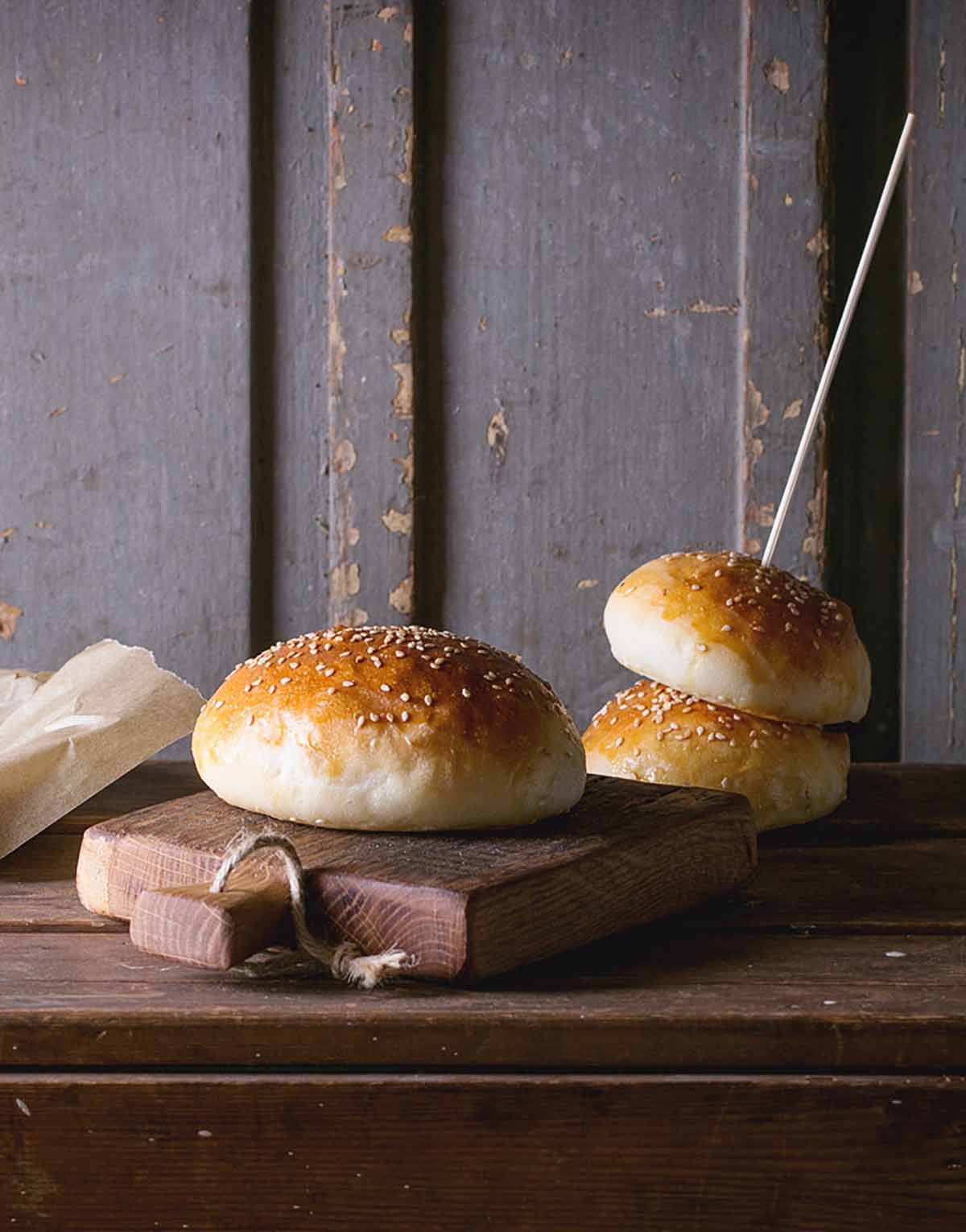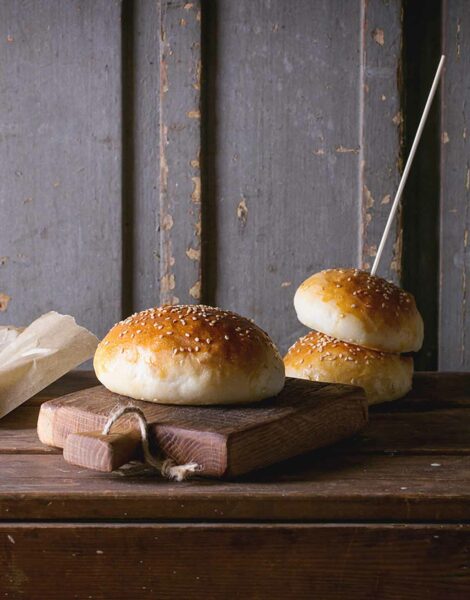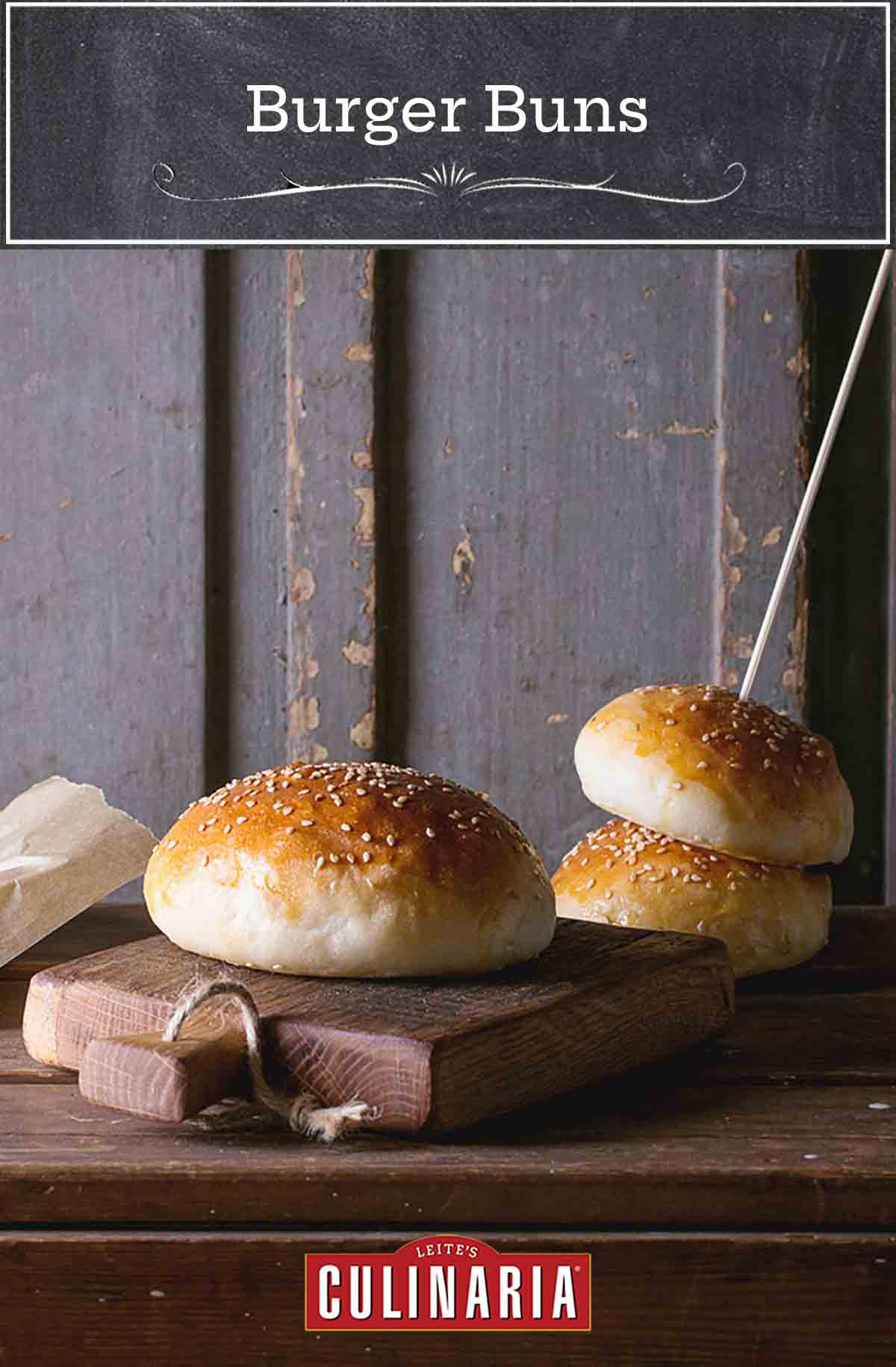
When King Arthur Flour first shared this recipe for homemade burger buns recipe online, the website was inundated with comments from home cooks declaring these lightly golden, sparely sweet, brioche-like buns “THE BEST.” We concur. (Literally. We had 17 of our recipe testers GUSH about them to us.) Without further ado, here’s how to make them.–Renee Schettler
HOW CAN I FINISH MY BURGER BUNS?
You have a few good options here. Butter will give your buns a soft, golden finish with just a bit of shine. Leaving them naked will give you a drier finish—flour-dusted almost. One final option is to brush them with egg whites. This will give your buns a darker, shinier finish. As well, if you want to sprinkle anything on those buns—sesame or poppy seeds, say—egg whites are what you’re going to want to use (see our Seeded Burger Buns variation below).

Burger Buns
Ingredients
- 3/4 to 1 cup lukewarm water
- 2 tablespoons unsalted butter, cold, cut into pieces
- 1 large egg
- 3 1/2 cups King Arthur Unbleached All-Purpose Flour
- 1/4 cup granulated sugar
- 1 1/4 teaspoons salt
- 1 tablespoon instant yeast
- 3 tablespoons butter, melted, plus more for the baking sheet
Instructions
- Mix and knead all of the dough ingredients except for the melted butter by hand, mixer, or bread machine until a soft, smooth dough forms.
- Cover the dough and let it rise for 1 to 2 hours, or until it's nearly doubled in bulk.
- Gently deflate the dough and divide it into 12 pieces.
- Shape each piece into a round ball, then flatten it to a squat round blob about 2 1/2 inches (8 cm) across. (Another easy way to shape buns, besides rolling them into balls and flattening, is to gently deflate the dough and form it into a smooth 8-inch (20-cm) log. Using a serrated knife, slice the log into 12 pieces. Gently tug the edges of each piece underneath the ball of dough to form a squat ball.)
- Place the buns on a lightly buttered or parchment-lined baking sheet, cover, and let rise for about an hour, until noticeably puffy.
- Preheat the oven to 375°F (190°C).
- Brush the buns with about half the melted butter and bake until golden, 12 to 18 minutes.
- As soon as you remove the buns from the oven, brush them with the remaining melted butter, which will lend the buns a satiny, buttery crust. Place the buns on a wire rack to cool completely. Proceed as desired.
Notes
Seeded Burger Buns Variation
If you’d like sesame or poppy seeds sprinkled atop your buns, brush the buns with the egg wash rather than the melted butter prior to baking as it’ll make the seeds adhere. Sprinkle the buns with the seeds and bake as instructed. (When you separate the egg, feel free to add the extra egg yolk to the dough for slightly richer results.)Bread Variation
Leite’s Culinaria reader and food blogger Sarah of The Cook’s Life has tweaked this recipe into loaf form. According to her, “We call it bun bread around here.” Well, we call it brilliant around here. Sarah says to follow the recipe through the first rise. Shape the whole batch of dough into 1 loaf and bake it in a 9-by-5-inch loaf pan for about 30 minutes at 350°F, or until it is browned, sounds hollow when tapped, and tests 190°F to 200°F in the middle. You may need to tent the top with foil if it starts to get too brown. And she mentions that if you don’t like sweet bread, you can reduce the sugar to 2 tablespoons or even 1 tablespoon with no other changes to the recipe. [Editor’s Note: Sarah makes a few other tweaks to the recipe, substituting white whole-wheat flour for some of the all-purpose. You can read about her changes in her comment below the recipe. We haven’t tested this variation yet, but we’re literally preheating our ovens now…]Slider Buns Variation
We all know that one-size-fits-all cliché is a bunch of baloney. Take hamburger buns. Sometimes you need something that’ll accommodate a brontosaurus-sized burger. Sometimes you need something that’ll suit wee sliders. And sometimes you need something that’s perfectly in between. We understand. So do the folks at King Arthur Flour, who suggest that, for slightly larger buns, you divide the dough into 8 pieces instead of 12 and bake the buns for 15 to 18 minutes. And for those wee slider buns—about 3 inches in diameter–divvy the dough into 24 pieces and bake for 12 to 15 minutes.Nutrition
Nutrition information is automatically calculated, so should only be used as an approximation.
Recipe Testers’ Reviews
These burger buns were a big hit at our last barbecue. The recipe is so simple and easy to follow. No taking water temperatures or proofing, just stir, let rise, shape, and bake.
I used the roll-into-a-log-and-slice method for shaping the buns, and it couldn’t have been any more effortless. These burger buns bake up somewhere between a ciabatta roll and a hamburger bun. The tops of the buns are crunchy but the inside is light and airy. They’re very satisfying but don’t overpower the flavor of the burger itself. Everyone loved them.
This isn’t your grocery store bun. This burger buns recipe turns out dense, delicious, and beautiful buns for serious burger connoisseurs only.
About that dense part…they’re a little denser than what your average burger eater may be used to. My solution? A little toasting on the grill grates or a buttered skillet. I opted to make 12 buns instead of 8, which worked well for a 1/4-pound bacon Swiss burger.
I really like this burger buns recipe. It’s one of the simplest yeast dough recipes that I’ve ever made. Throw everything into the mixer bowl and let it go. The dough is very soft and silky to work with.
The hardest part of the process is forming the buns themselves, and even that’s quite easy since this dough is very “manageable.” I brushed the buns with melted butter and topped them with sesame seeds, which toasted up quite nicely and added a slight crunch to the bun. The buns themselves turned out a lovely brown color and were soft and a little sweet.
These are so easy to make and much better than the pillowy ones you buy at the grocery store. Will make these again!
I like this burger buns recipe because the bun has brioche qualities without being dense and heavy. If you switch gears and break down the steps, you’ll see how easy the recipe is, and that it’s not at all excessive if you strive toward perfect burger bliss.
I want to make these every week for our Saturday night burger throw-down. Shoot for making 12 smaller buns rather than 8. Unless you eat 3/4-pound burgers, it’s hard to fill the larger buns edge to edge.
This recipe is incredibly easy to follow and is a great introduction for anyone who might be intimidated by baking bread.
It’s refreshing for a bread recipe to not give such specific instructions and still work. Combining all the ingredients at the same time (as opposed to dissolving the yeast separately) makes this a cinch to mix together, the rolls still rise beautifully, and cleanup is a bit easier as well.
Upon taking a bite of one of the cooled rolls, I was a little skeptical about how substantial they were and was concerned they’d be too heavy for burgers or sandwiches, but I was wrong. I used these for lamb burgers and the sturdy buns soaked up all the delicious juices and never got soggy. The slight sweetness of the bread complimented the meat nicely, too.
I used to have a hamburger bun recipe that I swore by, but this recipe changed my mind. My other recipe was really easy, but this is far better. These were beautiful.
I made them in my bread machine on the dough cycle, took the dough out after the first rise, and then formed them into bun shapes. They raised up nicely in another hour, then I basted them with the butter and they baked up in 14 minutes. Just perfect.
I’m a huge fan of all the King Arthur products. I sent my husband to Lake Charles to get me bags of flour because they didn’t sell it here in Lafayette.
This incredibly easy bun should be in everyone’s recipe box. Superior in every way to a store-bought bun, it makes your burger just that much better. Quick to toss together, it rises rather quickly too, and the finished bun is delicious with a nice crumb. Once you make this, you’ll be hooked!
Beautiful burger buns live up to the name! These buns were soft, moist, golden, and delicious little pockets of bread. I divided the dough into 12 pieces and basted them with melted butter before baking and after.
I served them as rolls with garlic and herb butter to slather on. We had 4 left and they were just as good the next day! They seem to be an “all-purpose” roll—could be used many ways—and a perfect start for the beginning bread maker. Thanks for this recipe! It’s in my permanent file now!
As a novice bread maker, this recipe was surprisingly straightforward and simple. And if you’re fortunate enough to have a stand mixer, that removes even more work!
The notes provided a tip for water amount versus weather, but I needed to use the full cup during a 100°F, humid Virginia day. I’d also include a suggestion to add the yeast and sugar to the water and wait a few minutes to make sure it’s active. Nothing is more depressing than making a beautiful dough only to not have it rise. I’m looking forward to trying the recipe again with an egg-white wash and sesame as well as poppy seeds.
I’ve been making these rolls for years. These are my go-to rolls for everything from actual burgers to breakfast buns.
These taste great and are neutral enough to go with everything but have enough inherent flavor to be eaten alone, say, alongside pasta. The recipe contains a description of the use of 3/4 versus 1 cup of water. While this is nice, really the baker needs to pay attention to the texture of the dough. It’s much easier to add flour than add water (at least in my experience). When I was first learning, I was told not to add more flour but this meant not to add too much. Instead, you want a dough that has enough flour so that there can be some gluten development (i.e., the dough will hold together and not be runny).
This version doesn’t say how long to mix the dough—one rule of thumb is about 5 minutes in a stand mixer and maybe 8–10 minutes by hand. I usually peek into the bowl at about 3 minutes and add flour (or water), if needed. When you think it’s ready, you can place your hand on the dough and it should come off without being too sticky. Add more flour at this point if it’s too sticky (if your hand is wet with dough) and continue kneading.
The dough after the first rise shouldn’t be so sticky that one can’t handle it. (I’ve been working with more wet doughs but it’s very hard to portion if it’s too wet.) My baking time was closer to 12 minutes, so I’d check after 8 minutes—the first time to turn for even browning.
This is an incredibly easy bun recipe to make with great results. We like a softer bun but one that doesn’t fall apart, and this was it. The rolls stood up to being the supporting actor to the main filling.
The bun was sturdy enough to stand up to the mayonnaise in a lobster salad without being overbearing. The lobster salad wasn’t outshone by the bun but you knew it was there. I took the suggestion of using a smaller amount of water since it was humid. The only thing I’d change is that I’d use a burger mold or rings to get perfectly round buns.
Fluffy and rich (but not as rich as brioche), these buns are really simple to make. They come out of the oven soft and stay that way, thanks to a good coating of melted butter on the top. We loved these and made them with the barbecue pork burgers.
The recipe was easy to weigh out, prepare, and bake. The instructions were clear, without too much detail. I was able to make 8 good-sized buns, which were slightly sweet and had a dense crumb consistency. The buns kept well until the next day, retaining their softness.
If you’re looking for some delicious buns, then try out this recipe for beautiful burger buns. It’s a very simple one but creates a delicious taste.
Next time, I’d make the smaller buns for a yield of 12 buns instead of 8. You could easily make these buns the day before a party. Expect to spend about 4 hours total but you can take care of the dough and then come back later to do the next step. I made the recipe using a heavy-duty stand mixer.
This recipe for burger buns appealed to me because most buns I purchase are too airy and flavorless. Those are fine for shredded chicken or pulled pork, but for a hefty burger, I want a little more substance and flavor. I appreciate that the recipe includes different portions and baking times to allow for a variety of bun sizes, from slider to BIG.
I bake bread a lot, and I usually make the dough by hand instead of using my mixer. For that reason, I chose to prepare this recipe by hand as well. I used the smaller amount of water, as the note on the recipe instructed. As I added the flour, I found that the dough was smooth and elastic before the specified amount of flour. The amount of flour I used was closer to 3 1/4 cups, and barely that.
Normally, I brush butter on my baked bread after they come out of the oven. This recipe instructed brushing with the melted butter before baking as well as after, so I did just that. I’m not sure it resulted in any greater softness than when just brushing after the baking.
I chose to make the 8 big buns. The buns baked up nice and golden brown with a satiny, buttery crust, just as the recipe described.
The texture wasn’t dense, but not airy either. When I sliced the buns, there were no large holes or dry crumbs. The buns held up well to 1/3-pound burgers without getting soggy or falling apart…even until the last bite.
These are my go-to burger buns. When you have this recipe, there’s no need to find any other. You can make them large or you can make them small for sliders. I’ve used egg wash and tried many different seeds, including sesame, caraway, and poppy. Not only is this a fantastic hamburger bun but, it’s quite good straight from the oven with a little butter.
This was a simple recipe that was really easy to follow. The flavor is fantastic and I actually liked them best when we ate them warm from the oven with some butter.
The use of instant yeast makes the dough quicker to assemble and faster to rise. I also appreciate any bread recipe that doesn’t call for bread flour as I have a small pantry and have to draw the line somewhere. The recipe didn’t specify if the butter in the dough should be melted or softened so I added it melted as I was using it for a later step and it was just fine.
I made 8 buns as per the recipe and they weighed 4 ounces each. That seemed like a lot of bread when my burgers are only 4 to 6 ounces themselves. I would make the rolls smaller next time. Also, I didn’t care for the step that called for slightly flattening the rolls after shaping. We all agreed that the rolls that I didn’t flatten looked better. I found the buns too heavy and dense for a sandwich. However, I was in the minority of my group who loved them with their burgers.
I will definitely make these again only smaller and served as a dinner roll.


















Thank you for this recipe, I really like the added info/ notes that expand on the original King Arthur recipe but why did you guys not include the grams info for the ingredients??? That’s like the most important part of any baking recipe!
You’re welcome, queenshaboo. And I agree on the grams. That’s why I did include them. If you look at the word INGREDIENTS above the ingredients list, to the right, there’s a toggle for US and METRIC measures. Click on METRIC. Like magic, you should see grams.
O.M.G. this is my new favorite recipe! I used the tuck and pinch method to form round balls of dough but did not flatten them before rising on the pan. They turned out beautifully, with enough height to cut easily into equal halves. I made half the batch plain and sprinkled everything seasoning on the other half. My family of 3 demolished the whole pan in 2 days! I can’t stop making these! I’ve got a “bun bread” loaf rising now, looking forward to toast in the morning. ?
I love hearing this, Rebecca. Seriously love it. It’s hard not to feel this way about these buns. Means a lot to me to hear how your entire family loves them. Thank you so much for taking the time to share that.
Made for my family’s 4th of July cookout. I made 4 variations; One sprinkled with Parmesan, asiago, and Romano cheeses; one with caramelized onions; one with sesame seeds; and kept the other batch plain. All were delicious and the bread was well received. Will make this again.
Love this! Thanks so much for sharing the toppings you tried, great inspiration.